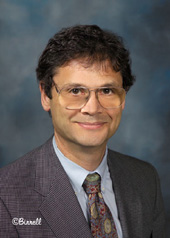 |
Stephen Rennard, M.D. |
She quit once for about two years, but then she said she made a big mistake and picked up a cigarette thinking she could smoke just one. She was hooked again.
Like many other smokers, Reed has chronic obstructive pulmonary disease (COPD), which makes it hard to breathe during activities that require exertion. UNMC currently is conducting two COPD research studies to find ways to help people such as Reed.
“People with COPD and those who don’t know they have it sometimes stop exerting themselves — they stop exercising, climbing steps, bowling and other simple tasks like shopping, which is unhealthy both physically and mentally,” said Stephen Rennard, M.D., Larson Professor of Medicine in the Pulmonary and Critical Care Medicine Section at UNMC and principal investigator of the UNMC studies. “There’s a large population of people who are suffering needlessly. These are important studies that may give us more tools to treat shortness of breath.”
Some, like Reed, have mild symptoms, which include shortness of breath with exertion and a cough. But others have more severe shortness of breath, cough up mucus, have a chronic cough and are more susceptible to chronic bronchitis, emphysema, pneumonia and sometimes death.
|
|
One study will test Tiotropium, also known under the brand name, Spiriva. The study is for smokers and non-smokers, age 40 to 80, with mild or moderate COPD who experience shortness of breath. The drug, which is co-marketed by Boehringer-Ingelheim and Pfizer, works by opening up the bronchial tubes in the lung, making it easier to breath.
The purpose of the national study is to explore the drug’s effectiveness, safety and effects on breathing capacity in 18 study participants at UNMC over a 28-week period. Activity levels and breathing also will be assessed during the study, as will the drug’s effect on physical activity, symptoms and productivity.
The study consists of nine office visits. Study participants will be given a once-a-day inhaler treatment or placebo.
A second study begins this month to determine the safety and effectiveness of an investigational drug, MP-376, for prevention of acute exacerbations of COPD. MP-376 is an inhaled formulation of Levofloxacin, an antibiotic currently used to treat serious infections. It is marketed by Ortho-McNeil in the United States and Sanofi-Aventis in Europe.
In this study, MP-376 will be delivered through a device called the PARI eFlow nebulizer, which converts liquid into a mist that can be inhaled. Study participants will receive the drug or placebo, twice daily for five days, every 28 days for six to 12 months.
Nationally, more than 200 study participants will be enrolled at more than 30 study centers in the United States, with seven participants at UNMC. To be eligible for the study, patients must be older than 40 years of age, have smoked a pack a day for at least 10 years, have a history of moderate to severe COPD with sputum production and have had two episodes of acute exacerbations of COPD in the past year but none within the past 30 days.
For more information about the Tiotropium study, contact Molly Deacon at (402) 559-8292 or mdeacon@unmc.edu. For more information about the MP-376 study, contact Lisa Graff, (402) 559-8915 or lgraff@unmc.edu.
Dr. Rennard receives payment as a consultant for Pfizer, sponsor of the Tiotropium study.